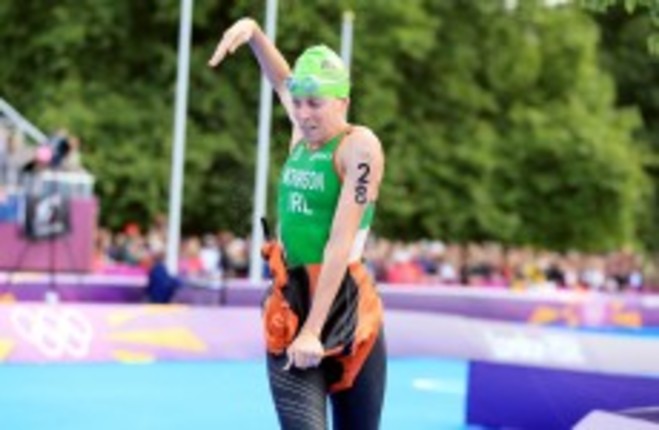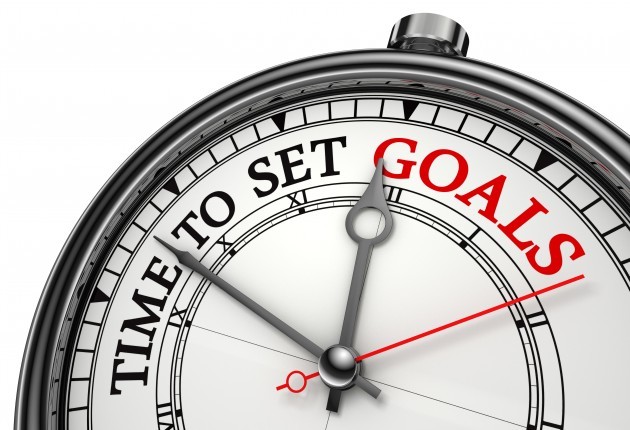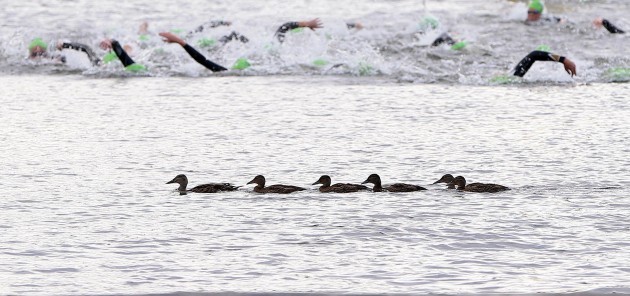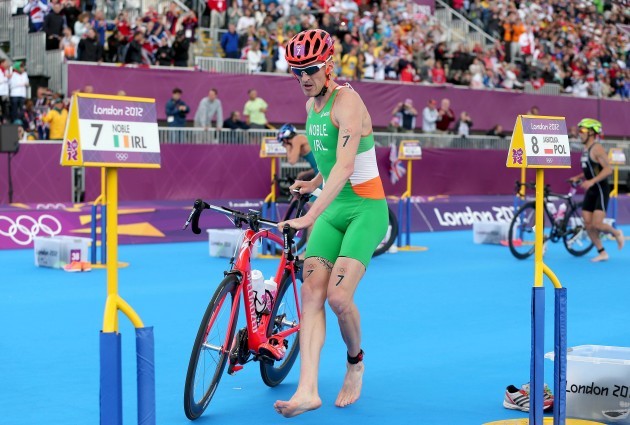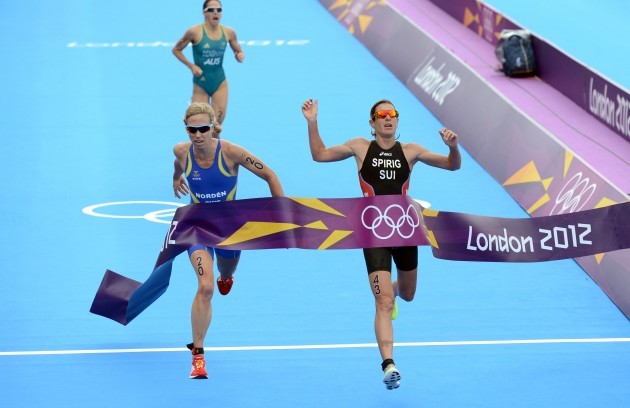THE LAST TIME you swam you had to be rescued from the hotel pool by the off-duty lifeguard on your Leaving Cert holiday. Now you want to do a triathlon? Not so fast…
Doing a triathlon is a very big commitment and shouldn’t be taken lightly – not least the swim element of it. There’s a huge amount to consider and even at the elite level, mistakes happen on the day of the event that are often the result of poor planning and preparation.
Planning and preparation. You cannot do enough of either and if your goal is simply just to finish the event, there’s still an amount to consider from nutrition, to appropriate attire, to training and recovery.
Here, we’ve compiled a check-list of things to help you through your first event.
1) Plan ahead
Don’t think you can rock up on the day of the event on your grandfather’s rusting steel beater and expect to get around the bike course okay. Don’t arrive to the water’s edge in February without a wetsuit. And definitely don’t run like you’ve left the oven on. Pick a triathlon that is two to three months down the line and map out a training schedule that you’ll stick to. A good start would be to plan two swim sessions a week, two or three bike sessions a week and two running sessions also. Given you’ll be doing these concurrently on the day, it’s advisable to follow a swim by a bike workout, or a long run after a spin on the bike. (The triathlon is swim-cycle-run).
The trick is to do a little, a lot of the time. This will also help to prevent injury because one of the biggest issues facing people who have never trained properly before is stress fractures. This occurs from doing a lot all too infrequently. Every year people decide to train for the Dublin marathon in August and run themselves into the ground for the 8 weeks prior to it, only to pick up shin splints or other overuse injuries close to the big day.
2) Set your goal to simply aim finish it
Sorry to be negative but your goal for your maiden triathlon should be to just cross the finish line, preferably having enjoyed it. It’s often said that failure is what we get for setting our goals too high and in relation to triathlon, it’s probably true. If you are lucky enough to complete your first one you’ve achieved something great but once you draw your breath you’ll probably start adding up the mistakes you made and minutes you feel you can save for the next time. This feeling is not to be underestimated. Too many go into their first triathlons thinking ‘it’ll be alright on the night’. Would you go into a final exam with that attitude?
3) Analyse the demands of each discipline
Swimming, cycling and running are three completely different sports and demand a huge amount from your body. All major muscle groups will be called upon for the event and any weakness you may have will be exposed on the day if you’re not prepared.
You need to know how long exactly each leg of the race is. You need to know is it flat or hilly? Is the water in a sheltered bay or not? What way is the wind travelling from? Where are the food and water stations? What kind of bike will I need? This is a checklist within a checklist.
4) Get a coach
This point is linked to the previous one and while you can research everything on the internet, the person who can give you the best insight is a coach. Very few of us are proficient in every discipline of triathlon. Some of us are lucky to be very good at one element. “Ah my swim and bike was okay but my run needs work” is the stock answer from anyone after a triathlon, or any combination of two.
The area you are worst at is most likely the one you dread training for and quite simply, have the wrong attitude for. You get better at something the more you do it. And a coach is the person who will be the one to make you admit this. He’ll also be the one to correct it. Swallow your pride – a coach is the best investment you can make.
5) Have the right equipment
Bluffing will get you to the start line, but not the finish line. Treat your first triathlon like it’s your last and give it the respect it deserves. Even if you just plan on doing one in your life make sure you have good quality, functioning equipment that fits you properly.
You need a wetsuit that will not leak and is not hanging off you. It cannot be too tight either as this will restrict blood-flow, so take time to get the sizing right. If you’re buying second hand, always try it on first and thoroughly examine it for holes.
Your bike is the next most important thing and again, fit is crucial. You can spend any amount of money on bikes these days so if you plan on using a €100 mountain bike or a €10,000 time machine, all that matters is you are comfortable on it and it functions properly. Appropriate running shoes are third in line when it comes to equipment and again, fit is everything.
6) Test the waters in the lead-up
Literally. Be it an hour or a day or a week before the event it’s always good to road test the equipment you’ll use on the day. You’ll have no one to blame but yourself if you arrive to the race and the bike your friend promised he’d bring is the wrong one. The day itself is stressful enough, but much of this can be self-inflicted. You need to have studied everything about the race. Where the transitions are, when you must dismount from the bike coming into those transitions, where you can remount. Get in the water, don’t get a shock on the day and realise it’s one degree cooler than you thought it’d be. Run the course or at worst, cycle it. Familiarity will train your brain into thinking it’s easier than it is.
7) Find your level
Confidence is great but a big mistake newcomers make is thinking they’re better than they are. They’ll start at the front of the swim, refuse to be intimidated but will suddenly find themselves in something that resembles a washing machine as the mother of all scrambles for position ensues at the front. You might only see it as a charity event. Others don’t. Start at the back and aim to stay in touch.
8) More is not always better
There’s no substitute for enthusiasm and motivation so another common mistake is going out and spending thousands of euros on a top-of-the-range bike, wetsuit, runners, goggles, socks, the lot. Then you hammer the road, pound the pedals and swim the length of the Nile. As mentioned already, triathlon puts huge demands on your body and you can become fatigued quickly. This has a negative impact on motivation. You need to be hungry to race, not to train.
9) Don’t start too slowly, or too fast
Finding your level is a very personal thing and only you truly knows how you feel on any given day. A coach can anticipate how you’ll feel based on his experience but he doesn’t know exactly how you are mentally. He can tell you where you need to be, but unless you want to be there, it’s pointless. Find swimmers that are at your level or ideally, slightly better. Similarly with the bike and the run.
There is ALWAYS someone better than you; the trick is to find someone just slightly better than you and allow them dictate a pace you’re comfortable with. If you’ve something left in the tank approaching the line, then you can make a dash. But be conservative and use your energy wisely. You can fool yourself into thinking you can stay with the best – and you might for a while – but you’ll run out of energy sooner than later.
10) Enjoy it
Triathlons are fabulous sociable events and are a bit of fun. They’re a great way to meet people, to stay fit, to keep you in on weekends, to raise money for worthy causes, to improve your self-esteem, for a multitude of reasons. The race is only between you and you. Irrespective of if you come first or last, if you tell someone you completed a triathlon the answer will be the same, ‘well done, did you enjoy it?’ As soon as the fun element goes out of it you’ll probably start losing motivation.
